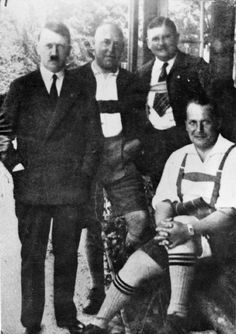June 30, 1934: The Night of the Long Knives
Left to right: Adolf Hitler, Gregor Strasser,
Ernst Röhm and Hermann Göring, 1932.
June 30, 1934: Adolf Hitler, Chancellor of Germany and Führer (Leader) of the Nazi Party, as paranoid as ever, consolidates his power with a "purge" that becomes known as "The Night of the Long Knives."
Ernst Röhm was the co-founder and leader of the Sturmabteilung (SA, meaning "Storm Division," or "Storm Troopers," also known as the "Brownshirts"), the Nazi Party's original paramilitary wing, which played a significant role in Hitler's rise to power. He and Hitler were close friends.
But Hitler began to see the independence of the SA, and the penchant of its members for street violence ,as a direct threat to his newly gained political power. He also wanted to appease leaders of the Reichswehr, the German military, who feared and despised the SA as a potential rival, in particular because of Röhm's ambition to merge the army and the SA under his own leadership.
Additionally, Hitler was uncomfortable with Röhm's outspoken support for a "second revolution" to redistribute wealth. In Röhm's view, President Paul von Hindenburg's appointment of Hitler as chancellor on January 30, 1933 had brought the Nazi Party to power, but had left unfulfilled the party's larger goals.
So, urged on by Hermann Göring, the President of the Reichstag (the national legislature), and Heinrich Himmler, the Reichsführer of the Schutzstaffel (SS, "Protection Squadron"), Hitler ordered a series of political extrajudicial executions.
The primary instruments of Hitler's action, which carried out most of the killings, were the SS and its Sicherheitsdienst (SD, "Security Service"); and the Geheime Staatspolizei (shortened to "Gestapo," meaning "Secret State Police"), under the command of Reinhard Heydrich.
Leading members of the Strasserist faction of the Nazi Party, including its leader, Gregor Strasser, were also killed. So were establishment conservatives and anti-Nazis, such as former Chancellor Kurt von Schleicher and Bavarian politician Gustav Ritter von Kahr, who had helped suppress Hitler's Beer Hall Putsch in Munich in 1923. In Godfather terms, Hitler was settling all business.
Röhm was arrested in Munich, but not killed right away. On the afternoon of July 1, in his cell, he was approached by SS-Brigadeführer Theodor Eicke and SS-Obersturmbannführer Michael Lippert. They handed him a Browning pistol with one cartridge, and said that he had 10 minutes to use it on himself, or they would do it for him. He refused, saying, "If I am to be killed, let Adolf do it himself." Eicke and Lippert then carried out their threat. Röhm was 46 years old.
There are 85 documented cases of people killed in the Night of the Long Knives. The actual death toll is usually considered by historians to be over 200, and may be as high as 1,000. But it did what Hitler wanted it to do: It strengthened and consolidated his support within the military, and provided a legal grounding for the Nazis, as the German courts and cabinet quickly swept aside centuries of legal prohibition against extrajudicial killings to demonstrate their loyalty to the regime. Now, without question, Hitler was, in the words he used before a July 13 speech to the Reichstag, "the supreme administrator of justice of the German people."
Hitler's sense of justice wasn't the only perverted thing about his government.
*
June 30, 1934 was a Saturday. Magician Harry Blackstone Jr. was born. And these baseball games were played:
* The Brooklyn Dodgers beat their arch-rivals, the New York Giants, 8-4 at the Polo Grounds. Ray Benge outpitched Carl Hubbell. Jimmy Jordan went 4-for-5 with an RBI. Giants player-manager Bill Terry and Mel Ott each went 1-for-4 with an RBI.
* The Boston Braves beat the Philadelphia Phillies, 6-2 at Braves Field in Boston.
* The Philadelphia Athletics beat the Boston Red Sox, 7-6 at Shibe Park in Philadelphia. Bob Johnson saved the A's with a home run in the bottom of the 9th inning, and then Frankie Hayes singled Bing Miller home with the winning run in the bottom of the 10th. Jimmie Foxx went 0-for-4 with a walk for the A's.
* The Chicago Cubs beat the Pittsburgh Pirates, 6-4 at Forbes Field in Pittsburgh. Paul Waner went 1-for-5, and Lloyd Waner went 1-for-4 with a walk.
* The Cincinnati Reds beat the St. Louis Cardinals, 11-4 at Crosley Field in Cincinnati. The Reds scored 9 runs in the bottom of the 8th inning.
* The Chicago White Sox beat the Cleveland Indians, 2-1 at Comiskey Park in Chicago.
* The St. Louis Browns beat the Detroit Tigers, 4-3 at Sportsman's Park in St. Louis. Harlong Clift singled Rollie Hemsley home with the winning run in the bottom of the 10th inning. Tigers player-manager Mickey Cochrane went 2-for-3 with 2 walks and 2 RBIs. Hank Greenberg went 1-for-5.
* And, in what is, as far as I know, a unique example in MLB history, the New York Yankees were supposed to play the Washington Senators at Griffith Stadium, but, according to Baseball-Reference.com, the game was postponed -- due to wind. Not rain, not snow, not cold, but wind.
It was postponed until August 7, as part of a doubleheader. The Yankees won the opener, 4-3. The Senators won the nightcap, 6-3. Over the 2 games, Babe Ruth, in his last season as a Yankee, went 0-for-6 (only pinch-hitting in the nightcap); Lou Gehrig went 1-for-9 with a walk and an RBI; and Senators shortstop-manager Joe Cronin went 2-for-8.



Comments
Post a Comment